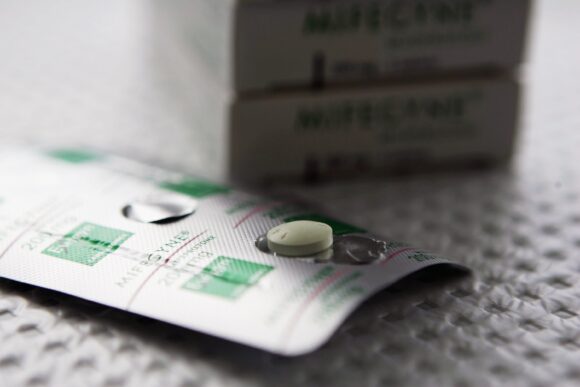Texas officials are warning health care providers to stop sending abortion pills into the state or risk fines and prosecution, as Attorney General Ken Paxton seeks to halt the flow of medicine that’s circumventing local restrictions.
Prosecutors wrote to three providers last week, including a California doctor and a Delaware women’s health clinic, citing evidence that they had sent the drugs that can end a pregnancy to women in Texas. They could be fined $100,000 for every violation of the state’s anti-abortion laws, according to the letters dated Aug. 14 that were shared with reporters in an email from Paxton’s office.
“If you refuse to comply, a formal investigation will be initiated, and the Attorney General may bring a lawsuit against you,” prosecutors told Debra Lynch, a nurse practitioner in Delaware and the founder of the women’s health clinic Her Safe Harbor.
Lynch, who has been the subject of media profiles in which she described sending pills to Texas, said she had legal representation and wasn’t worried about the warning.
“I don’t have room to be scared because women are literally dying,” she said in an interview, adding that the group previously received similar warnings from Louisiana and other states with abortion bans.
Abortion opponents are trying to whittle down sources for the pill mifepristone any way they can. Lawmakers in states across the country have introduced bills to classify it as a controlled substance and limit telehealth access. In 2025 legislative sessions, 32 bills to ban medication abortion and 38 bills limiting access were introduced, the most since Roe v. Wade was overturned in 2022, according to a tracker from the nonprofit research group Guttmacher Institute.
After pressure from religious groups, the big box retailer Costco Wholesale Corp. last week announced it would stop selling abortion pills, even in states where the procedure is legal. The company didn’t comment on the groups’ campaign but said that it hadn’t seen consumer demand for the medicine.
The Texas prosecutors cited evidence gathered from news reports or lawsuits when claiming the providers sent pills into the state. In a letter to California doctor Rémy Coeytaux, they referenced a civil lawsuit filed in July by a man who accused his girlfriend of violating state laws by using abortion pills to end two pregnancies. The lawsuit cited a Venmo receipt for the purchase of the pills from Coeytaux.
“You have been named in a recently filed lawsuit as having shipped abortion pills into the State of Texas,” prosecutors wrote to Coeytaux. He didn’t respond to a request for comment.
Lynch said the legal threats prompted her to urge women seeking mifepristone to do everything they could to avoid leaving a digital trail when purchasing the medication. She recommended ordering it over the phone rather than using the Internet.
She also sought to reassure women that the letter didn’t mean they would be arrested for purchasing the pills. Women aren’t prosecuted for having an abortion in the state, which targets abortion providers. Lynch said her clinic wouldn’t stop sending the pills to anyone who needed them, no matter where they were located.
“We will always provide safe access to abortion medications — right up until the last one of our providers is taking their last dying breath,” she said.
Topics Texas
Was this article valuable?
Here are more articles you may enjoy.



 Florida’s Commercial Clearinghouse Bill Stirring Up Concerns for Brokers, Regulators
Florida’s Commercial Clearinghouse Bill Stirring Up Concerns for Brokers, Regulators  Nine-Month 2025 Results Show P/C Underwriting Gain Skyrocketed
Nine-Month 2025 Results Show P/C Underwriting Gain Skyrocketed  ‘Structural Shift’ Occurring in California Surplus Lines
‘Structural Shift’ Occurring in California Surplus Lines  Florida Engineers: Winds Under 110 mph Simply Do Not Damage Concrete Tiles
Florida Engineers: Winds Under 110 mph Simply Do Not Damage Concrete Tiles 

